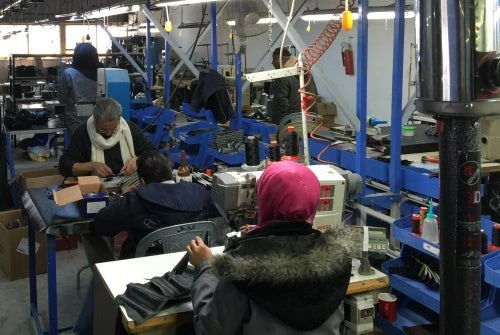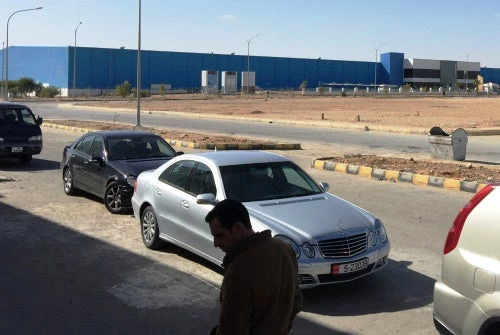 For the last six weeks or so I have been more or less full time engaged in thinking about how we can generate employment opportunities for Syrians in countries that are hosting them, particularly those located in Syria’s near neighbors. I have reflected on my experience in working on private sector development in Syria nearly a decade ago. As someone who had worked in virtually every country in the Middle East I was amazed at the country’s industrial potential. My senses – my eyes, my tongue, and my ears enjoyed walking the souks of Aleppo and Damascus observing the amazing artisanal capabilities in furniture, handicrafts, fabrics and confectionaries. So in thinking about how the Bank can help the Syrian refugees, my mind quickly turned to the question of finding the entrepreneurs and artisans behind this wealth of capabilities.
What could the World Bank do to help Syrian entrepreneurs? Could we for example replicate our efforts with the Pashtuns of Khyber Pashtoonkhwa a few years back? There we had helped small businesses get back on their feet after their livelihoods had been destroyed by the Taliban. Was something similar possible?
For the last six weeks or so I have been more or less full time engaged in thinking about how we can generate employment opportunities for Syrians in countries that are hosting them, particularly those located in Syria’s near neighbors. I have reflected on my experience in working on private sector development in Syria nearly a decade ago. As someone who had worked in virtually every country in the Middle East I was amazed at the country’s industrial potential. My senses – my eyes, my tongue, and my ears enjoyed walking the souks of Aleppo and Damascus observing the amazing artisanal capabilities in furniture, handicrafts, fabrics and confectionaries. So in thinking about how the Bank can help the Syrian refugees, my mind quickly turned to the question of finding the entrepreneurs and artisans behind this wealth of capabilities.
What could the World Bank do to help Syrian entrepreneurs? Could we for example replicate our efforts with the Pashtuns of Khyber Pashtoonkhwa a few years back? There we had helped small businesses get back on their feet after their livelihoods had been destroyed by the Taliban. Was something similar possible?
The thought became even stronger when last week I was driving around Jordan and visiting some economic zones which the Jordanians have offered as places where investors could set up and employ Syrians. There we met some Syrian investors, such as Ahmed. Ahmed was an early mover – a manufacturer of footwear he moved at the beginning of the crisis and reestablished his small enterprise in the Jordanian town of Ma’an. From a small beginning, he now has 30 staff who are for the most part Jordanian. We then went to Karak and met Moustapha, another Syrian with a similar story who manufactures confectionary, selling to various places around the world including the Dominican Republic.
As I was driving back to Amman later that afternoon – I thought whether we could find more Ahmeds and Moustaphas. We had heard of another 10 or 20 such small to medium enterprises in Jordan and some others in the Gulf, Turkey and Egypt. These were the lucky ones – investors whose businesses were not destroyed, and who were able to move some capital, machines and know-how out. What about the unlucky ones – those whose businesses have been destroyed? Estimates are that over 50% of Aleppo’s manufacturing capacity was destroyed . Aleppo: this manufacturing center in the Middle East – the place that manufactured ‘manufacturing capacity’, like tools and dies – was lost. What could be done?
 Could we build some small buildings like the one Ahmed occupies in the picture – could we help finance replacement equipment? What could we do to help get these entrepreneurs back on their feet and contribute to the economies of their host countries? First we needed to find them – so I began to brianstorm on this topic with whomever would listen.
Could we build some small buildings like the one Ahmed occupies in the picture – could we help finance replacement equipment? What could we do to help get these entrepreneurs back on their feet and contribute to the economies of their host countries? First we needed to find them – so I began to brianstorm on this topic with whomever would listen.
Omer Karasapan, a fellow blogger on all things linked to refugees from the Middle East, and I talked about this challenge. We know, from our experience in fragile environments, that it is often the diaspora that are the first movers. So we looked at the data first. The Syrian diaspora itself is a phenomenan that is now multi- generational (originating as far back as the 19 th century) with the majority in the Americas. Brazil, USA, Argentina, Mexico & Canada account for 75% or more of the Syrian diaspora , with the rest scattered around Europe, Africa and Oceania. The refugees have quite a different pattern. The largest concentration of refugees outside the region are in Germany and Sweden. The vast majority of refugees, however, are still in the countries neighboring Syria: Turkey, Lebanon and Jordan. What faciltiies might be needed to bridge this geographical divide, and match refugee populations with potential investors from the diaspora?
In short we need help and we would welcome ideas on this topic. We hear of lots of informal activity in this space and as an institution, the Bank would like to find ways of supporting initiatives that will make a difference for refugees and the communities and countries that host them. In particular we are looking for ways of bringing the skills, entrepreneurial acumen and capital if available to help solving the challenge of finding jobs in Jordan, Lebanon and Turkey.


Join the Conversation